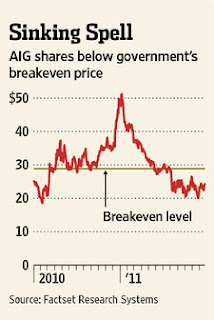Friday, 23 December 2011
AIG's Benmosche Extends His Stay
American International Group Inc. Chief Executive Robert Benmosche has told the company's directors that he would like to remain in his job longer than previously planned, signaling he is in for the long haul after weak markets slowed the government's exit from the bailed-out insurer.
Mr. Benmosche said in an interview that he plans to run New York-based AIG beyond next year, his health permitting. The 67-year-old, who was diagnosed with cancer in late 2010, previously indicated he planned to return to retirement sometime in 2012.
"I've talked to the board and said that if I stay healthy—and I'm still hopeful—I would like to stay on for another year," he said. "I want to stay active and energized, and having too much time on my hands is not healthy, I think."
AIG's board doesn't have to approve Mr. Benmosche's decision to stay, according to people familiar with the matter. The CEO previously threatened to quit two years ago due to frustrations over government-imposed pay curbs. The issues were worked out, and now the U.S.-AIG partnership is likely to last longer than both sides wanted, even though the government currently is a passive shareholder.
Robert Benmosche, in his family's theater, says that getting the government out of AIG is 'not a priority.'
Mr. Benmosche's latest comments come as AIG shares have declined 50% this year. The share price needs to improve before the government will consider reducing its stake.
But getting the government out is "no longer important; it's just not a priority" for the company because it is up to the Treasury Department to decide when to sell, Mr. Benmosche said.
A year ago, AIG was an improbable market darling, its stock soaring and generating hope that the U.S. could completely exit its investment in AIG by 2012. The Treasury still owns 77% of AIG following its 2008 rescue of the company and a sale in the spring of some AIG stock. Since then, "with the market situation and confusion in Europe, all that has changed the climate," Mr. Benmosche said.
Company and government officials still want to earn a profit for U.S. taxpayers on the Treasury's $40 billion-plus AIG investment, so the government has put off plans to divest its remaining stake until market conditions improve, say people familiar with the matter.
Mr. Benmosche said AIG's share price last December "was abnormally high," partly a result of the relatively small percentage of stock in the public's hands at the time. But the shares currently trade at about half their book value, or reported net worth, reflecting investor doubts about AIG's balance sheet and profitability.
Mr. Benmosche, who joined AIG in August 2009, has been widely credited with turning the company around and selling assets to help repay its record bailout, which at its peak used over $130 billion in taxpayer funds. He previously was CEO of MetLife Inc. from 1998 to 2006, the year he retired.
AIG recently started buying back shares in the open market as part of a $1 billion program unveiled in November. Mr. Benmosche wouldn't disclose how much stock AIG has repurchased but said the buybacks will continue. He said the share repurchases are meant to signal to investors that "we have a high degree of confidence…that we have excess cash" even amid weak markets and a year in which insurers had to foot large bills for damage from major earthquakes, storms and other disasters.
Since November, AIG's shares have traded between $20 and $25, below the $28.73 level that Treasury needs to break even on its investment in the company. The shares closed Thursday at $24.16, up 8 cents.
The shares have dropped 17% since AIG's stock offering in May, underperforming other large property-and-casualty insurance companies but doing better than the stocks of large banks and some life insurers.
Over the past few weeks, senior executives met with investors from Denver to Boston, including some who say they can't find any compelling reason to buy the shares when there are other, better-performing insurers to invest in.
Mr. Benmosche said he has told investors that AIG expects to rebound as markets start to improve, and the company is focusing on profitability by being selective about the insurance policies it writes.
He also has said AIG has the option to allocate capital to overseas growth markets if the U.S. commercial-insurance industry proves too competitive. But he acknowledges that investors' doubts about AIG's reserves are a "headwind" that will take a long time to overcome.
AIG sees a planned initial public offering of its aircraft-leasing unit, International Lease Finance Corp. as a priority next year, Mr. Benmosche said. The timing of ILFC's stock offering hasn't been decided, but the goal is for the first sale of a minority stake in the world's second-largest aircraft lessor to fetch as much as $2 billion to $3 billion, according to people familiar with the matter.
Proceeds from the IPO will go to the U.S. Treasury, which is positioned to recoup another $6.8 billion in bailout funds from AIG asset sales. Another slug of cash, roughly $1.5 billion, is sitting in escrow until it can be released to help pay down the balance.
Mr. Benmosche said getting the ILFC IPO done will give AIG flexibility on what to do with its one-third stake in pan-Asian life insurer AIA Group Ltd., which currently is worth $12 billion. AIG can sell some of its AIA stake now, but company officials would prefer to wait for a more-opportune time.
AIG also is working on being "Fed-ready" in 2012, by preparing its internal controls, finances and risk management systems to meet standards of the Federal Reserve, which could become the company's primary regulator due to AIG's size and its ownership of a thrift.
read more: Olympus Wealth Management
Subscribe to:
Post Comments (Atom)



No comments:
Post a Comment